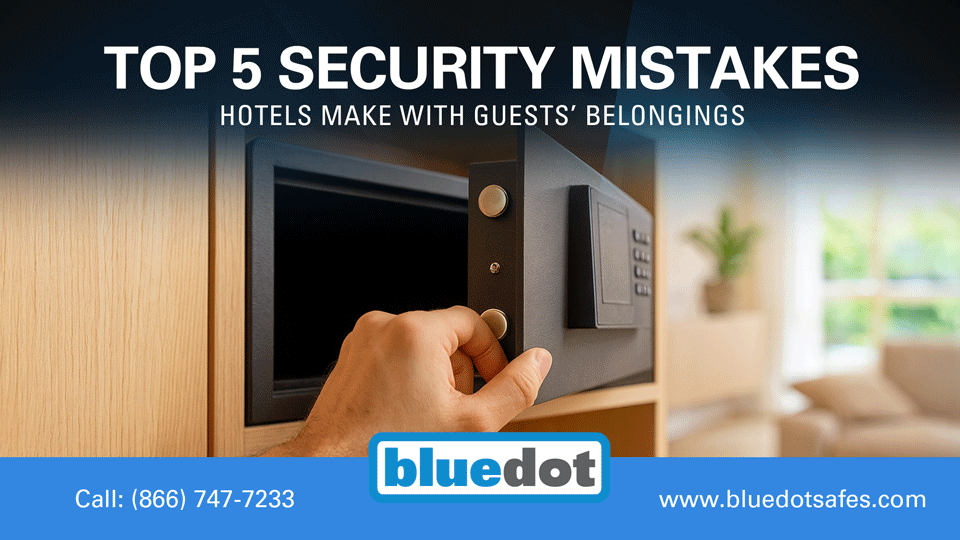
Top 5 Security Mistakes Hotels Make with Guests’ Belongings
Top 5 Security Mistakes Hotels Make with Guests’ Belongings

Top 5 Security Mistakes Hotels Make with Guests’ Belongings
In hospitality, guest trust is everything. A single theft or loss can cause serious reputational and financial damage. Today’s guests expect the same level of protection in their rooms as they do at home—or even higher. A visibly outdated or poorly maintained safe can instantly reduce their confidence in your brand.
Below are five common security mistakes hotels make—and how to prevent them to keep guests’ belongings and your reputation secure.
At Blue Dot Safes, we help hospitality leaders strengthen loss prevention strategies through reliable, purpose-built safes and procedures designed to protect both cash and accountability.
✅ 1. Relying on Outdated or Low-Security Safes
Many hotels still rely on old, thin-walled in-room safes that offer minimal burglary resistance. These models may deter casual tampering but are no match for determined theft attempts.
What to do instead:
- Don’t rely on outdated or low-security safes. Upgrade to modern models with digital audit trails that record every access attempt—vital for compliance and accountability. Choose UL-rated or high-security safes that are designed for frequent guest use and long-term reliability.
🔩 2. Failing to Properly Bolt Down In-Room or Back-Office Safes
Even a heavy safe can be easily removed if it isn’t securely anchored. A thief can remove an unanchored safe—and once it’s gone, so is everything inside.
What to do instead:
- Always bolt safes to a concrete or reinforced surface to prevent physical removal. In addition, use a floor-mounted door stop to prevent the door from swinging into walls or furniture when opened.
🔐 3. Weak Key Control and Poor Access Code Management
Lost master keys, shared access codes, and unsecured drawers are among the biggest internal security threats in hotels. An unsecured key or shared code can compromise dozens of guest safes simultaneously.
What to do instead:
- Use safes with dual-control or biometric access, ensuring no single staff member can open them alone.
- Secure all loose keys in locked drawers or cabinets—never leave them in open storage.
- Keep extra copies of keys on hand to prevent downtime due to loss.
- Assign unique access codes for each staff role and update them regularly, especially after staff turnover.
💰 4. Overlooking Back-Office Security
While guest safes are often prioritized, back-office safes can be an even greater point of vulnerability. Cash deposits, master keys, and daily revenues often sit in unsecured or outdated safes.
What to do instead:
- Use Depository or Drop Safes that allow cash drops without providing full access to internal contents. This minimizes internal theft and improves accountability during shift changes.
🧾 5. Neglecting Regular Maintenance and Inspections
Even the best safe requires upkeep. Sticky keypads, weak hinges, or low batteries can lead to malfunctions that leave valuables exposed—or inaccessible
What to do instead:
- Heavily used safes require regular maintenance and inspections. Test lock functions, check bolts and hinges, and replace batteries yearly with high-quality alkaline batteries to ensure uninterrupted operation. A safe door should never swing freely when open—if it does, it may need adjustment.
🏨 Final Thoughts: Guest Safety Reinforces Brand Trust
Hotels that proactively secure guests’ belongings don’t just prevent theft—they reinforce their brand promise of safety and reliability. By investing in modern safes, maintaining strong key control, and committing to regular maintenance, you protect both your guests and your reputation.
💬 Looking to upgrade your hotel’s safes or strengthen your security setup?
📞 Call us at (866) 747-7233
📧 Email: [email protected]
🌐 Visit: bluedotsafes.com
Built for protection. Trusted by hospitality professionals. Secure by design.






